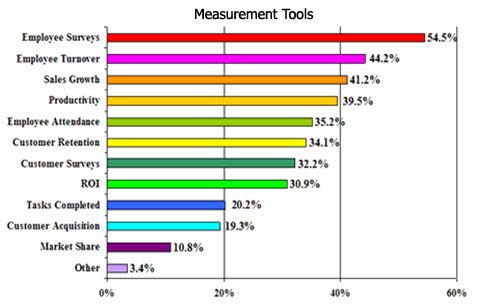
|
FACT Unfortunately, according to an article by Richard Koestner, many people do fail to adhere to their new years resolution. Specifically, 22% will fail after 1 week, 40% after one month, 50% after 3 months, 60% after 6 months, and 81% after 2 years. Let’s try not to be part of these facts!
Do you have a funny or clever caption for this photo? Please send them to us and we’ll feature the best in our next issue of Astronology!
Retaining Talented and High Performing Management Staff

With the economy starting to pick up, proactive HR professionals want to make sure their key talent doesn’t walk out the door. But what are the most effective ways to ensure employee retention? With all the motivational tools out there, it’s hard to know which is the "right" one to use. In this issue of Astronology we examine research results prepared by the Forum for People Performance Management and Measurement. Not familiar with the Forum? The Forum’s goal is to generate a better understanding of how organizations can and should implement award / motivational programs for success. Additional, the Forum strives to examine the extent to which these programs can achieve a broad range of organizational objectives. Results from the Forum’s recent study, Awards Selection: Insights from Managers, shed light on the ability of 12 distinct motivational tactics to achieve 10 specific organizational objectives. Of particular interest is that HR professionals across many industries use these varied tactics. As discovered in the comprehensive Awards Selection study, both non-cash and cash awards are widely used to motivate management staff. Overall, HR managers expressed a preference for non-cash reward and recognition programs, with "management recognition" reported as the leading non-cash tactic. Study respondents reported different levels of effectiveness for cash and non-cash awards depending on the specific business situations they were facing. Furthermore, a recipient’s job function, an organization’s size and culture, and whether objectives are short- or long-term are among the variables that affect the outcome of motivational tactics. As such, the techniques aren’t plug and play. We must pay close managerial attention to the techniques’ application to ensure optimal results. The majority of responding organizations prefer non-cash motivation solutions to achieve most business objectives, as shown in Figure 1. These organizations perceive non-cash programs as considerably more effective for activities designed to positively impact internal operations and for those designed to improve customer relations. The organizations view non-cash programs as more effective for 9 of the 10 organizational objectives studied including the following:
• reinforcing organizational values/culture;
Most Used Reward / Recognition Tactics (Figure 1)
Measuring the success of the various reward / recognition programs takes a variety of forms, including employee survey results and employee turnover rates. Please see figure 2 for the full complement of measurement tools used by responding organizations. Measuring the Success of Reward/Recognition Programs (Figure 2)
These data points are helpful for external benchmarking, and providing food for thought. When it comes down to it, however, there are some basics for successful retention of management employees. These keys include the following:
• Availability of superior to listen and provide guidance
Of these basics, the three that appear to have the most impact are the following: Communication. Communication is the overarching theme in the survey response data. Can your managers go to their supervisors to talk through challenging issues? Do your managers clearly know what you expect of them? Do they receive feedback more frequently than during their annual performance appraisals? Empowered to manage. Micromanaging isn’t cool, unless you want to have high management turnover. Managers need opportunities to use their judgment, try new things, and learn how to handle varying situations. Effective administrative systems. The third most prevalent theme in the survey data is the effective administrative systems with the subtheme of resource management. While there are burdens, daily stresses, and worries that come with being a manager, organizations with successful management retention will provide tools and resources to help managers overcome these challenges Layered on these retention keys is the importance of successful personal practices. Quality of life, specifically life/work balance, is important for manager retention. Leaving work at home and having time for self and family are significant to managers. "2010 is going to be a challenging year – in a variety of ways," explains Astron’s National Director Jennifer Loftus. "As the economy continues to move in a positive direction, we have challenges associated with ramping up our operations capabilities. At the same time, in HR we have the challenge of retaining our key talent. There are always job opportunities for star employees. As organizations begin to hire again in greater numbers, the risk of undesired turnover grows." If your organization hasn’t put a management retention program in place already, it’s time to get started on your plan.
Reader Poll Archive
Wonder what your fellow readers think about critical HR topics? Is your organization unique from or similar to others?Click here to view the results of our past polls!
Coming next time in Astronology
Have a Question?
If you have a topic you would like addressed in Astronology, or some feedback on a past article, don't hesitate to tell us! Simply reply to this e-mail. See your question answered, or comments addressed, in an upcoming issue of Astronology.
Looking for a top-notch presenter for your human resource organization's meeting? Both Jennifer Loftus and Michael Maciekowich present highly-rated sessions on a variety of compensation and employee retention issues. For more information, send an e-mail to info@astronsolutions.com.
Are you reading a pass-along copy of Astronology? Click on
this button
Send inquiries to info@astronsolutions.com or call 800-520-3889, x105.
The Fine Print
We hold your e-mail address in trust. Astron Solutions promises never to share or rent your personal information. We also promise never to send you frivolous e-mails and will allow you to leave our list, at your option, at any time.
To remove yourself from this list, please follow your personalized subscriber link at the bottom of your Astronology alert e-mail. Copyright 2010, Astron Solutions, LLC ISSN Number 1549-0467 |
||

